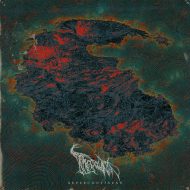 I can’t tell you how much trouble I’ve had in writing this band’s name down. I keep defaulting to The Condition. By way of information, Thecodontion – I’m resorting to cutting and pasting now – come from Italy, and this album is their first, following a demo and an ep. “Supercontinent” takes us through Earth’s continental drift phase, and features amongst other things cataclysmic events leading to the collision and break up of land masses – a suitable subject for a black/death metal band, which Thecodontion are. It seems also that they prefer heavy bass to guitars.
I can’t tell you how much trouble I’ve had in writing this band’s name down. I keep defaulting to The Condition. By way of information, Thecodontion – I’m resorting to cutting and pasting now – come from Italy, and this album is their first, following a demo and an ep. “Supercontinent” takes us through Earth’s continental drift phase, and features amongst other things cataclysmic events leading to the collision and break up of land masses – a suitable subject for a black/death metal band, which Thecodontion are. It seems also that they prefer heavy bass to guitars.
Dark growly sounds from a faraway land lead us in. The drum beat is distinctive. “Vaalbara” is dirty old school black metal. It could have been recorded in the 1990s. I lost the lyrics at this early point. “Extensional faults during feisic volcanism, both coeval with impact layers, paleomagnetic data showing igneous complexes of what could have once been part of the same” may mean something to a degree holder in geology but not to me, either in a song or as growled here in an old but not ancient style. Those bass guitars – two of them – continue to growl while there’s plenty of passion in those deep and throaty vocals, which have the narrative style that you’d associate with Enthroned. The drum work has authority and strangely, there’s a gloomy melancholy about it all. There’s even a climax to “Ur”, whose last line ironically is “yet it remains hopelessly obscure”. I found that this was too heavily packed with lyrics, educational as they might be. The instrumentals, when left to their own devices, do create images of dark, transformative and even violent worlds.
This theory was put to the test with “Lerova”, an actual instrumental, and sure enough, there is a gloomy cosmic atmosphere without interference. I’m not sure for how much longer I was going to be able to put up with the bass plucking, though. No such cerebral challenge on “Nuna”, which heads off violently at breakneck speed. All this activity suggests collisions. “Rodinia” suggests harsh landscapes. Somewhere in the musical interior of this, I detect post metal. It certainly comes from that world where natural forces dominate and humans don’t get a look in. After an instrumental interlude, an another grim and growly attack in the form of “Laurasia-Gondwala” takes over. There’s a momentary explosion but it’s soon back to the narrative and remorseless bass, which I would say take us nowhere, which is true musically but what was less apparent, the ice had melted and: “now petrified voltziaelan conifers evolve, extinct glossopterids reach diversity, plant-vertebrate-insect ecosystem results, hexapods codevelop, therapsids arrive”. So all in all, something important but is this the right vehicle for expressing it, I ask myself. As the 7 minute “Pangaea” imposed itself upon us, I reflected that there was less turmoil than motion, as the music drives forward. “Pangaea” has rare energy in spite of all the heaviness surrounding this album. I think the balance between the instrumentals, which are allowed to express themselves, and the narrative is better here, and there is a sense of flow. The album closes with the instrumental “Panthalassa”, at first a piece of plodding bass, followed by a tune and an inevitably deep bass solo section. Where this all led us, I don’t know, but I’d been thinking that throughout this different but obscure work.
Heavy is usually good, but I found this old school lead weight of an album was a matter of survival. It is a weighty subject, and they certainly do justice to that. I don’t doubt the genuineness of it, nor the intensity of its concept but … I did get a sense of journey and there were atmospheric sections, but overall for me “Supercontinent” was just hard work to listen to.
(4/10 Andrew Doherty)

Leave a Reply